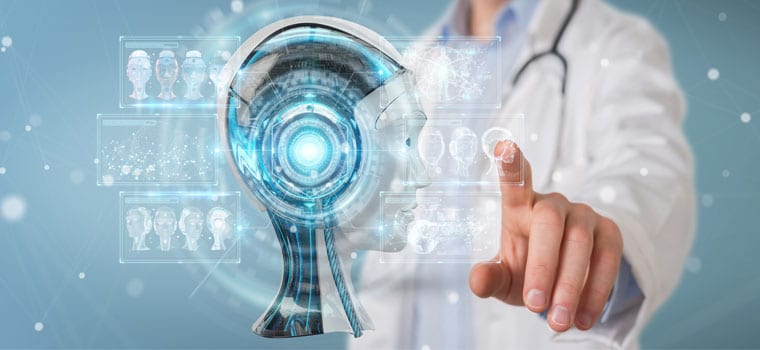With the advent of machines, mankind and machines have become inseparable. The way machines have become an integral part of our everyday lives, it would not be an exaggeration to call this period The Machine Age. This opened avenues for artificial intelligence technologies like machine learning and deep learning that brought machines and humans closer.
Machine Learning has invaded every single aspect of our lives right from home to office, from communication to transportation, from shopping to healthcare. Implementation of machine learning in healthcare and pharmaceuticals is relatively new but you would be astonished to know that it is advancing at a very fast pace and the revolutionary advances it can bring about. Interested? Read on.
1. Timely Diagnosis with Machine Learning
The medicine world at large is struggling with the timely and correct diagnosis of life-threatening diseases like cancer and degenerative mental disorders like Parkinson’s disease, depression among others.
World’s major tech companies are working to combine Machine Learning computing with healthcare requirements for research and develop diagnostics and treatments.
Biopharma Company Berg is working on applying Machine Learning along with AI to oncology in order to detect and chart out a course of treatment.
IBM’s Watson Genomics is another prime example of using the benefits of Machine Learning to detect critical diseases at a nascent stage.
Google’s DeepMindHealth is working on eye care.
However, these intelligence augmenting tools are in their initial phases to resolve as to what has worked best in the past.
2. MRI Imaging by Implementing Machine Learning
Microsoft’s Inner Eye, as an image diagnostic tool, aims at changing the future of MRI imaging by correctly diagnosing the tumors at an early stage. This groundbreaking technology has made medical imagery a part of Machine Learning-driven diagnosis.
Oxford P1Vital’s PReDict is working on mental healthcare in feasible clinical settings.
However, while deep learning systems can diagnose, it cannot explain how it arrived at conclusions, doctors are wary of making crucial life-and-death decisions without any scientific backing of how the machine diagnosed the condition.
3. Implementation of Machine Learning in Treatments
Personalized medicines based on the needs of an individual are a hot research area. Medicines tailored to a person’s medical history, genetic lineage, past conditions, allergies, etc. Applying Machine Learning will help in charting the course of treatment concerning which medicines a person is sensitive to or reactive to.
Drugs to be administered can be tailor-made suiting an individual’s needs right from common to specialized ones with iterated dosages.
Apart from a correct diagnosis, it is precision medicine that is required to arrest the growth of the diseases.
Microsoft’s Project Hanover along with The Knight Cancer Institute is working for cancer precision treatment.
Handpicked Content for You
How Voice Assistants are Transforming the Healthcare Operations
4. Machine Learning and Drug Discovery
Machine Learning has one of its best uses in speeding up drug discovery. It can help in the initial screening of drug compounds and go on to predict the success rate based on biological factors.
If Machine Learning is successful in revolutionary drug innovations, it can cut out big stakeholders in the field of pharmaceuticals by bringing the costs of life-saving medicines considerably.
IBM and Google are using next-generation sequencing for bringing about desired results in this field.
MIT Clinical Machine Learning Group is working on medicines for Type 2 Diabetes.
5. Behavioral Modifications by Machine Learning
Machine Learning can effectively monitor conscious behavior and involuntary gestures. A prime example of machine reading into the behavior of humans is Somatix. It monitors hand to mouth gestures of people who smoke and help in smoking cessation.
Machines can read behavioral patterns of individuals more minutely and can help prescribe preventive medicines. Preventive medicines can be successfully used in cancer prevention and identification, patient treatment, etc. with the help of Machine Learning.
6. Machine Learning in Record Management
Maintaining and updating medical records manually is by no means an easy job. Even though technology has made its presence felt in the field of maintaining health records as data entry, it is extremely time-consuming.
Machine Learning can save time, money and effort by fastidious electronic maintenance of medical records.
Newer data is being integrated continuously from mobile devices to make sense of live health data. Apple’s Research Kit is being aided by Machine Learning in the treatment of Parkinson’s Disease and Asperger’s Syndrome with this maintenance and updating of records.
7. Radiotherapy and Radiology Are Machine Learning Aided
A major hindering factor in the treatment of cancer has been its late detection. In most of the cases, treatment starts in later stages bringing down the efficacy of treatment.
The demarcation between healthy and unhealthy tissues, normal and abnormal lesion growths is one of the most sought-after Machine Learning-based algorithms. Google’s DeepMindHealth and UCLA have been working together to develop a Machine Learning algorithm that can detect differences in healthy and cancerous tissues to improve and have more targeted radiation treatments. It is aimed at speeding up the segmentation of the tissues and increasing the accuracy in radiotherapy planning.

8. Robotic Surgery
How does the prospect of getting operated by a robot sound?
When Machine Learning merges with the surgical aspect of medicine, it can help conduct surgeries with finer details, fewer tremors, and in tight spaces. The steady motions and dexterous movements of robotic limbs are controlled by the commands of human controllers. The da Vinci Robot has garnered much interest and curiosity world over as the robot surgeon.
Surgical intervention by robots can be effectively used in the suturing, evaluation of surgical skills, improving surgical robotic materials, and surgical workflow modeling in pre and post-operative experiences.
However, not all surgeries require Machine Learning but computer vision, for example, hair transplant surgery.
9. Upscaled Medical Data Through Machine Learning
By going through the enlarged medical information provided by people voluntarily can help tackle crucial diseases and a chance to look into unique cases. This crowdsourced data can help make real-time changes to the future of treatment.
IBM along with Medtronic is working on diabetes and insulin data to help find a treatment and a cure.
OCR techniques like Google’s VisionAPI and MATLAB’s Machine Learning-based handwriting recognition technology are working to read the uploaded medical prescriptions to be able to go through the medicines and treatment provided by the medical professional world over.
10. Clinical Trials and Research
Machine Learning can help in predictive investigation of ailments, identifying the best prospective sample set of clinical trial candidates with their real-time monitoring and access to their medical database. It can leverage electronic records to minimize data-based errors.
11. Predicting Outbreaks with The Help of Machine Learning
Our scientists now have easy access to a large amount of information from satellites and websites. Artificial neural networks take this information to predict diseases from malaria to major epidemics. Machine Learning in partnership with AI is monitoring and predicting the outbreak of epidemics around the world. This inflow of information is most useful in the case of the third world countries which have the poor medical and educational infrastructure and zero to bare minimum treatment options.
A key example of Machine Learning in the prediction of an epidemic outbreak is ProMed-Mail. It monitors present diseases and emerging ones and provides real-time updates on the outbreak. In 2014, it successfully predicted the outbreak Ebola virus epidemic.
Two Major Future Applications of Machine Learning
Mechanical Recommendations
The future of Machine Learning in healthcare lies in machines working automatically to administer a tailor-made set of drugs to humans. For example, how about having an Alexa style machine doling out your medical course of treatment along with medicines?
Self- monitoring insulin checking pumps are already on their way out.
However, there are legal constraints that need a long check on viability, safety with superiority to other methods.
Intensifying Athletic Performance
Usage of Machine Learning in sports medicine is not just about promoting health apps. It seeks to work towards performance enhancement, injury management, managing stress levels, etc.
IBM has partnered with Orreco to boost athletic performance. A similar partnership between IBM and Under Armor took place in 2016.
Fitbit is an example of IoT which aims towards keeping a tab on athletic performances.
Conclusion
Implementation of Machine Learning has an exciting future in the fields of healthcare and pharmaceuticals. However, the need is to make it a more viable option available at cheaper rates in the wake of a shortage of medical professionals and an increasing world population.
Want to develop your next healthcare app with Blue Whale Apps’s AI Consulting Services? Look no further than Blue Whale Apps. Contact us now






